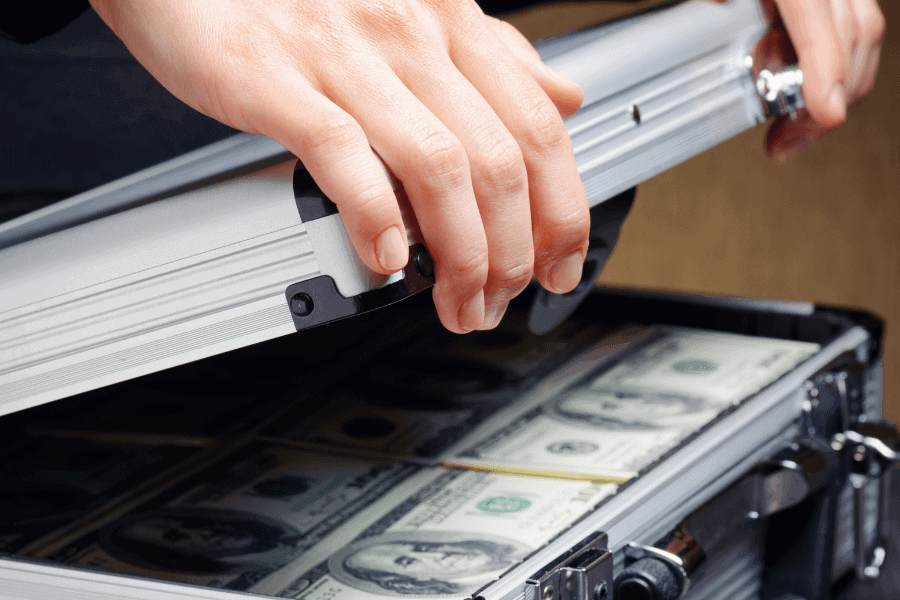The War on Cash: How to Avoid Civil Forfeiture
October 21, 2022
Dateline: Hong Kong
I’ve mentioned this before, but it’s worth mentioning again — Hong Kong loves cash.
So does Switzerland. And Germans have historically always loved cold, hard cash. Even Middle Eastern countries do, too. I once saw an Iranian guy carrying $4 million in cash!
But since I’m in Hong Kong, I’ll tell you a little story about my experience with cash here.
As the Chinese Lunar New Year approaches, everyone in Hong Kong descends upon their local bank. The idea is to exchange bank notes to give away as gifts. Basically, people are here to make a change and lots of it.
Some of these people even need a wheelbarrow for their money!
On one occasion, I saw the guy in front of me withdraw what looked like about HK$150,000 – almost $20,000 – in $100 and $500 banknotes. The lady in front of him must have had a much larger gift list because she took out so many stacks of $20 note that my duffel bag might not have held them.
And in each of these cases, the biggest challenge for the customer was getting their cash through the window in the bulletproof glass. The second hardest part was waiting for the cash counting machines to tally up the loot.
These people did not have a problem with receiving strange looks or having the police called on them. No forms were filed for their withdrawals or exchanges. There was no government bureaucracy involved and they were not told that they were walking around with too much cash.
There is no war on cash. Here, cash is acceptable. In fact, it’s good.
There is nothing illegal about possessing cash, nor does anyone care. You’re not a tax dodger just because you have large volumes of cash.
Of course, Hong Kong is one of the few places that think that way.
Most countries, especially ones as small as this, have currency restrictions and currency reporting requirements that require you to fill out forms and speak to the customs office to declare your cash. And some even have cash deposit limits as well.
These countries parrot the line that such cash reporting requirements are not capital controls, and I suppose they aren’t. Until some airport security guy or customs officer — or in the case of the US, the IRS or a local police officer — unilaterally decides that your cash must have been earned illegally and takes it.
The 21st century has seen the emergence of a war unlike any other. On one side of the battlefield are governments, banks, credit card companies, central banks, and other financial institutions. On the other side, cash and anybody who uses it.
We are constantly under the threat of civil forfeiture if we use the system “improperly.”
While proponents of a cashless society would have you believe that terrorists, drug lords, and criminals are the only people who would ever use cash, there are more people than you would imagine on what seems to be the losing side of the war.
Regular, law-abiding people often use cash to make legitimate transactions without paying fees to a credit-card processor. Or there are small business owners that deposit their daily earnings in cash. And then there are those individuals who simply don’t trust financial institutions that want to gamble with their money.
The War on Cash would translate that mistrust for criminality. In this article, we will cover the following about carrying or depositing cash in the US and across some international borders:
- The War on Cash
- Cash Carrying Limits
- Requirements for Carrying Cash Across International Borders
- What Currency to Declare at Customs
- Currency Reporting Requirements and Measures From Around the World
- Cash Deposit Limits and Civil Forfeiture
The War on Cash

To understand the War on Cash, we must understand two main points. First, the demise of cash can be contributed in part to the ease of payment through digital financial transactions.
Sure, having a cashless society could make things more convenient in an increasingly digitized world, but with that digitalization also comes new worries. Instead of worrying if your cash will get confiscated by a government official, you now have to worry if there could be data and security breaches.
With the digital surveillance of just about anything these days, you can bet that includes your wealth. I don’t know about you but seeing the targeted ads that pop up on my social media proves to me that this is true.
It certainly makes me question my financial privacy. I couldn’t even buy a hot dog in Sweden with cash – I was required to pay by credit card. Besides a marketing company that might be tracking sales trends, who needs to know that I bought a hot dog?
Second, as much as the government would like to paint the War on Cash as an indispensable measure for taking down criminals, drug dealers, bribers, terrorism, and tax evasion, it’s not a convincing argument.
Now you have to add cybercrime to your list of worries. Yes, there are some safeguards and protections in place, but the international community is still sorting out enforcement treaties for cybersecurity.
And I don’t think the government even believes the war on cash is enough to take down criminal activity. Why else would US counterterrorism officials monitor money via the Swift global system?
Criminals will find a way to be criminals, with or without cash.
Exerting Control
The war on cash is really about one thing—control.
We all know that governments — especially in the west — love to tax much of what you earn with the argument that without them, you’d be a subsistence farmer living in a mud hut. But many governments don’t just want to know what you do with whatever you have left, they also want to control it.
And cash limits their control.
Central bankers and politicians alike recognize that cash gets in the way of their monetary experiments with negative interest rates. Before the era of negative interest rates, banks would pay you, in interest, for the money you placed in their coffers. With negative interest, the incentive to keep your money in a bank has since declined.
And that’s exactly what the government and central banks want.
If you can’t save it, you spend it, right? And if people are forced to spend their money, that will stimulate the economy, right? Except for the people who don’t allow the government to manipulate their actions and choose to save their money — in cash — under their mattress.
That would explain why the demand for cash and the sale of safes have both increased dramatically in recent years. It also explains the sudden, forceful attack on cash. Without cash, there’s little you can do to avoid the scheme of central economic planners.
Cash Carrying Limits

In the war on cash, there are certain limits that are imposed on those that either carry cash across borders or those that deposit cash. Countries vary in their currency reporting requirements, but you can be sure that most are trying to assert some form of control by enforcing these limits.
And if you don’t follow the rules, it could result in your assets being confiscated. But more on that later.
First, let’s look at the many reporting requirements and measures that different countries have taken.
Requirements for Carrying Cash Across International Borders
Technically, it is legal to carry as much cash as you like across almost every international border. If you have more than the limit, all that is required of you is to declare it.
Most countries around the world have currency restrictions when you enter and leave the country. Typically, countries have adopted the US$10,000 reporting limit put in place by the United States. In most of Europe, the limit is 10,000 euros.
In fact, when I once took a flight from Cancun to Germany, I saw these reporting requirements at work.
As I mentioned, Germans love keeping cash on hand. And as efficient as they are, they always like to do so with high-value banknotes since they’re easier to store.
This explains why there were two agents at my boarding gate quizzing everyone getting on the plane about any cash that needed to be declared. Holding up cash declaration forms, they ensured that people with more than US$10,000 turned them in at the gate.
However, in some developing countries, they place more strict limits on the amount of local currency you can export. For instance, China limits the amount of renminbi you can take out of the country to about $5,000 per departure.
While carrying cash in any amount is technically legal, we must accept reality.
I don’t particularly trust customs agents with the knowledge that I’m traveling with lots of cash. There are too many horror stories of people who complied with the law only to be accused of being a drug dealer and then had their money confiscated.
When the government confiscates your money at a border, you have to hire a lawyer and fight to get it back. Some governments routinely deny requests to release cash taken by customs agents, even though their theft violates your constitutional rights.
What Currency to Declare at Customs

Carrying other financial instruments in large quantities is also legal, but you must report them too.
In addition to a hard currency like coins and bills, you must also declare foreign currency, securities, stocks and bonds, travelers checks, money orders, promissory notes, payable interest coupons, and similar financial instruments.
It’s really all up to a customs officer’s interpretation, but assume the law mandates anything monetary. Precious metals are also subject to reporting.
For precious metals, I generally tend to believe that most countries want you to report based on the street value of any gold or other metals you’re carrying, not the cheeky argument of the face value printed on the mint coin.
Some countries in the European Union (EU) require you to report gems, which don’t carry a face value. It would be up to you to document their value and then bear the burden of proof at customs to avoid confiscation.
If you’re looking to escape the watchful eye of the government, you would likely create as much of a paper trail carrying your cash through the airport as you would simply wiring it overseas.
For gold and silver, it can be shipped by logistics companies that handle all of the dirty work, which I highly recommend. Or, you could simply sell it at home and buy it back overseas for more privacy, since overseas gold stored in a private vault is non-reportable.
Of course, you often can’t trust these guys to interpret any law the same way twice.
Currency Reporting Requirements and Measures from Around the World
We compiled the currency reporting requirements for a number of countries to show you in which countries it is relatively easy to carry cash in, and which are less forgiving. Make sure you note the local currencies used.
Australia. Traveling in or out of Australia with AU$10,000 or more requires you to file a form before travel. And it’s not very easy to travel out of Australia without using an airport.
China. A country that requires forms for bringing in milk powder surely requires forms for currency. You can bring US$5,000 OR RMB 20,000 in or out. Remember that China has strict limits on the transfer of its renminbi currency. Gold and silver, even set in jewelry, should be reported when exceeding 50 grams.
The European Union. An oral declaration is required for amounts of €10,000 or more when traveling between two EU countries, say from Germany to Italy. When travel involves a non-EU country, you are required to file a written currency reporting form.
Hong Kong. Hong Kong was previously notorious for not having any currency reporting limits, until a new law passed in 2018. Since then, all travelers must declare cash sums greater than HK$120,000 when they move in or out of the country. While Hong Kong is still one of the last places on earth that I expect to see a war on cash, this new law was passed to prevent money laundering.
India. Foreign currency of US$5,000 in cash or US$10,000 in travelers’ checks, or more, must be declared. It is illegal to import Indian rupees unless you’re a resident of India returning with pocket change. It’s basically illegal to leave with rupees too unless you are a resident of India and even that comes with caveats.
Mexico. Mexico technically requires all foreign currency to be declared upon arrival, and only what’s leftover to be taken out when you leave. Mexican pesos in the US dollar equivalent of up to $10,000 don’t have to be declared.
Singapore. This country does not have a limit on how much cash you can carry in and out of the country, but they do require a currency declaration if the amount is more than S$20,000 (about US$15,000). Considering that Singapore produces a S$10,000 banknote — the most valuable single banknote in the world — carrying money in and out of the country should be easy.
Switzerland. This is one of the only countries in the world that does not require you to declare currency of any amount. This means that you may import or export any amount of Swiss francs or foreign currency without a reporting obligation. If you want to bypass the system of control or forgo all the paperwork, you might want to consider moving large amounts of cash here.
Thailand. Given Thailand’s political status, their exemption on traveling with cash is reasonable; you can take US$20,000 or its equivalent in or out without any obligation to report. Importing or exporting Thai baht is a bit different, with only THB 50,000 allowed out unless you’re going to one of several Association of Southeast Asian Nations (ASEAN) countries, in which case the limits may be higher.
United Kingdom. Carrying cash of £10,000 or more in or out of Great Britain and to or from any other country will require a declaration. You will even need to make a declaration if you carry this amount from Great Britain to Northern Ireland. However, if you carry it from Northern Ireland to Great Britain, no forms are required.
United States. The United States requires the reporting of $10,000 or more in financial instruments carried in or out of the country. Anyone with this amount or more must file Form FinCEN 105. People or family members traveling together can not “structure” their cash amongst each other to avoid individual reporting.
There are governments that have introduced measures to reduce the amount of physical cash or cash payments.
For example, France introduced laws restricting French citizens from making cash payments over €1,000 and reduced the limit at local government finance offices to €300.
Russia, Italy, Mexico, Uruguay, and Spain have also created similar laws limiting cash payments over a certain value.
Then there’s the European Central Bank, who officially voted to eliminate the €500 note. This decision reduced the amount of physical cash by approximately 30%.
In Norway, the largest bank has called for the elimination of cash in an effort to fight money laundering and black-market sales. Though
Sweden might beat them as the world’s first cash-free country — most retailers no longer even accept cash payments there.
And big banks that operate in the United States, like Citibank, are also lobbying for the elimination of cash.
Of course, laws of this nature change all the time, so you should double-check before traveling.
Cash Deposit Limits and Civil Forfeiture

Earlier I mentioned that if you didn’t follow the rules, your assets could get confiscated. I also referred to the term “structuring.”
Basically, running a cash business — at least in the US — is difficult.
Let’s understand why.
As defined by Britannica, civil forfeiture is a “legal process that enables a government to seize property and other assets belonging to persons suspected of committing a crime.” While this law started as a way to fight organized crime, today it is used to seize huge piles of cash.
As I said, the war on cash is about control. And civil forfeiture is no exception.
With western governments getting increasingly desperate, even an elderly Mexican restaurant owner in Iowa who uses cash starts to look like a criminal to these guys.
And it’s not just the IRS that is doing all the seizing, it is often local police departments too.
In fact, John Oliver has a rather funny episode on this. He states that society’s trust in the police is essential, but in the US this trust has been undermined by civil forfeiture. That’s no surprise.
During the episode, you hear civil forfeiture referred to as “legalized robbery,” which is difficult to report when the entity you’re supposed to report it to is the one robbing you.
He claims that most of the victims of civil forfeiture were never even charged with a crime. But that’s exactly how this works — if the police or IRS has any suspicion whatsoever that your cash or assets could be involved in a crime, they have the right to confiscate it.
And that’s how a local police station can end up with a new daiquiri machine.
But let’s go back to the case of the restaurant owner in Iowa and look at this from the cash deposit limit perspective.
In the US, banks are required to report any cash deposits over $10,000 to the government.
The civil forfeiture law requires every bank in the US to report any “suspicious activity” — which can mean something as simple as making regular deposits of large amounts of cash. In 2013, the federal government received roughly 1.6 million such suspicious activity reports.
You could have been one of them.
Now, banks aren’t necessarily the bad guys here; they’re obliged to follow these procedures. I’m sure they don’t like all the extra paperwork either. But it certainly beats getting sent to jail or paying a hefty fine.
Knowing that there is a $10,000 limit, some people may logically think to make deposits under that amount instead.
But that is actually illegal! Making several deposits under $10,000 can be considered as structuring, which is when someone purposefully makes deposits under $10,000 to evade the reporting requirement.
It’s considered a crime, even if you earned the cash legally.
And that is exactly where our Iowa restaurant owner comes in, and where she probably represents a lot of small business owners.
She was subject to civil forfeiture because she repeatedly deposited cash under the $10,000 limit.
Was she some ill-willed criminal mastermind trying to avoid the government’s watchful eye? No, she was a small business owner who made regular cash deposits of the earnings from her restaurant, which often amounted to less than $10,000. Sometimes, you don’t know what you don’t know.
While you can try to get your cash or assets back from the government, the burden is on you to show proof. But given that this policy lacks common sense as is, it might be an uphill battle.
If the simple act of depositing cash can raise suspicion and subject, someone, to the loss of all their assets, you can bet there is a war on cash.
To avoid civil forfeiture and such suspicions, it would be wise to ensure your repeated deposits are over $10,000.
Conclusion
Reflecting on my experience of being forced to purchase a hotdog by card and the experience of the Iowa restaurant owner, it made me think just how bad the war on cash is getting worldwide.
And while legalized robbery is happening in the US through cash deposit limits and civil forfeiture, it is not the only place where there is a war on cash. There are other governments that might confiscate your safe deposit box too.
Experts such as Deutsche Bank CEO, John Cryan, have predicted that cash will be gone within a decade.
And, even if you don’t use cash, don’t make the mistake of thinking this doesn’t impact you. Steve Forbes said it well when he warned, “Beware politicians trying to limit the ways you can conduct private economic business. It never turns out well.”
This also highlights why you should consider a safe haven that appreciates someone carrying cash or precious metals; a safe haven that doesn’t automatically assume you’re a criminal.
The sooner you can (legally) get your money out, the better. Take it from the Germans: having wealth in a country that has declared a war on cash is a bad idea, and it can be helpful to physically move that wealth as the banking system becomes more closely watched by powers that be.
To avoid becoming a casualty of this war or of civil forfeiture, you should consider:
- Storing your cash in smaller countries
- Diversifying your cash from the US dollar or the euro
- Having a store of value in large quantities in a cash-friendly country
- Avoiding Central America
For example, when you consider that Hong Kong and Singapore are excellent places to store wealth, their lax currency restrictions become quite valuable as well.
And when you take into account that Switzerland is well placed within Europe, it also offers value for those wishing to take money to Europe.
Or, for those with gold, Austria is one of the only places in the world that allows you to store it anonymously.
And if you don’t want your bank account to get seized overseas, you should avoid making deposits in countries that are on a financial watchlist.
While there is momentum for cashless societies and security reforms are bringing about the death of cash, there are still countries that love it. And that’s precisely where you should invest.
If you’re a seven- or eight-figure entrepreneur that also loves cash, our team at Nomad Capitalist is ready to help you determine where to store it. Who knows, we might even know where you can buy a wheelbarrow.


Does Puerto Rico Pay Taxes to the US?
It’s a common question and one that often fuels confusion, debate, and a fair share of misinformation – Do residents of Puerto Rico actually pay US federal taxes? When most people think of US tax obligations, they naturally assume they apply uniformly across all US citizens. But when it comes to Puerto Rico, things are […]
Read more

Zug Canton Taxes: The Ultimate Destination for Wealth Management in Switzerland
Switzerland’s global reputation is built not just on stunning views of Alpine peaks and serene lakes but also on a foundation of exceptional quality of life, world-class infrastructure and investor-friendly tax policies. The results speak for themselves: efficient public transport seamlessly links cities and villages; the standard of living regularly ranks among the highest in […]
Read more

How Smart Investors Use Venture Capital to Build Wealth
Big companies like Google, Amazon, Facebook and Apple all started out as bold ideas backed by venture capital. Decades later, the same firms are household names, as familiar to most people as electricity, the internet, or the telephone. But hindsight is a fickle friend. The truth is, it wasn’t always so obvious they’d succeed. These […]
Read more




